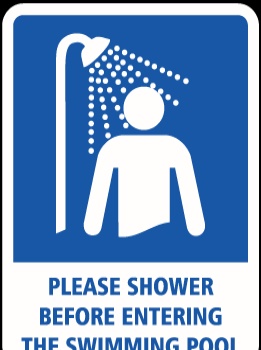
I am sure most people have seen the signs as you enter most aquatic facilities, that state that local code requires all swimmers to shower BEFORE entering swimming pool. If you are not a swimming pool professional, you may wonder why patrons are required to shower before swimming. The simple answer is that by showering off before swimming, you are helping keep the swimming pool water clean, and reducing the spread of illness to others. However, I am not going to give you just the simple answer! According to a survey performed by the Water Quality and Health Council, only 44% of American Adults regularly shower before entering the pool. My hope, is that by giving you the nitty-grittydetails of what effect NOT SHOWERING has on the pool water, I will encourage you to shower before swimming!
Reason #1: Showering reduces the spread of Recreational Water Illnesses (RWI’s). Most RWI’s are spread through fecal matter. Chances are, on any given day, you have trace amounts of fecal matter on your body. If you don’t shower before swimming, you are allowing that fecal matter to mix with the pool water. Illnesses such as e. coli, norovirus, and cryptosporidium are all spread through contact with fecal matter. Even at the highest acceptable chlorine level, it would still take about a week to kill the Cryptosporidium parasite! The Center for Disease Control recommends that parents give their children a lot of bathroom breaks while swimming, check swim diapers often, and shower children after each bowel movement while swimming!
Reason #2: Introducing organic compounds into the water, can be bad for your health! Deodorants, soaps, moisturizers, perfumes, sweat, detergents and fecal matter, all have organic compounds that contain proteins in them. When mixed with chlorinated water, disinfectant by-products are created. One of the by-products is a gas called Trihalomethanes (THMs). This gas creates Chloramines. Chloramines create that chlorine smell that you may notice around a swimming pool. Most people think this smell is an indicator that the pool is clean. However, the opposite is true. Chloramines, and their smell, are an indicator that the water isn’t well maintained. A well-managed swimming facility should have little to no chlorine odor. Not only is the odor from the Chloramines, unpleasant, it can also irritate your eyes and skin. With prolonged exposure, studies have shown that it can increase your likelihood of developing asthma!
Reason #3: It reduces operating costs. You may not think this impacts you, but if operating costs skyrocket, chances are the consumer will have to pay more money to use the pool and enroll in its programs! When patrons don’t shower, more chlorine is needed keep the water clean. The more chlorine that a pool uses the more pH lowering chemical we have to use. Chlorine is high in pH, so we have to use an acid to bring the pH level down to a comfortable level. Both these chemicals are expensive. Additionally, the more chemicals we use, the more wear and tear on our automatic chemical feeders. Finally, when you shower before swimming, loose hairs, lint and other dirt is usually removed from your body in the shower, and not in our swimming pool. Which means less man power is needed to clean the pool.
Now, why should you shower AFTER using the pool. This answer may seem more obvious. It is to remove any contaminants that got on your skin while you were in the pool, and to remove any chlorine and chloramines from your body. Chlorine and chloramines left on the skin for a prolonged period of time can cause rashes and other irritations.
So next time you come for a swim, please do your part to reduce the spread of RWI’s, maintain pool cleanliness and reduce operating costs by taking a quick shower before jumping in!



